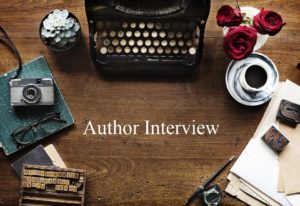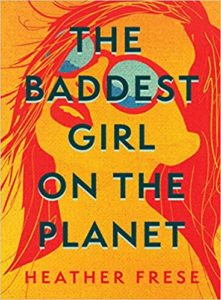An Interview with Heather Frese
 In high school, I visited the Outer Banks a few times with my family, and each time we went, I didn’t want to go back home. As author Heather Frese knows and mentions, it really is “a magical place,” one she captures well in her debut novel The Baddest Girl on the Planet. The book has been called “snappy” and “an absolute knockout,” something any author would be thrilled to hear about their work. And Heather is no newcomer to praise: the book won the Lee Smith Novel Prize and her writing has earned notable mentions in Best American Essays and the Pushcart Prize Anthology. Like all the authors I interview, Heather wears many hats, including that of wrangler of three small children, so I’m especially thankful she found time (and energy) to share her thoughts with me.
In high school, I visited the Outer Banks a few times with my family, and each time we went, I didn’t want to go back home. As author Heather Frese knows and mentions, it really is “a magical place,” one she captures well in her debut novel The Baddest Girl on the Planet. The book has been called “snappy” and “an absolute knockout,” something any author would be thrilled to hear about their work. And Heather is no newcomer to praise: the book won the Lee Smith Novel Prize and her writing has earned notable mentions in Best American Essays and the Pushcart Prize Anthology. Like all the authors I interview, Heather wears many hats, including that of wrangler of three small children, so I’m especially thankful she found time (and energy) to share her thoughts with me.
Christina: Congratulations on your debut novel, which released on March 2! Can you give us a quick description?
Heather: The Baddest Girl on the Planet is coming-of-age novel set on Hatteras Island, North Carolina. Hatteras has unparalleled beauty, just this wild magic that’s coupled with isolation and an extremely small and close-knit community. The protagonist of the book, Evie, finds herself saddled with a bad reputation at a young age (she blames Mike Tyson for this), and must work to come to terms with and eventually redefine that vision of herself as she explores relationships that are romantic, platonic, and familial.
Christina: What was your inspiration for the book? Was there a particular moment when the story, or a line, or a character came to you?
Heather: The setting came first. The Outer Banks of North Carolina are hugely inspirational to me and so rich with metaphorical content. Years ago, for my first assignment in creative writing in college, I wrote a scene of two little girls meeting on a sand dune at the Frisco National Seashore campground. I named them Evie and Charlotte. Then I wrote a book, currently in revision, that centered on Charlotte with Evie as a secondary character; it was a somewhat autobiographical grief novel. After that I thought I was tired of long projects, but I wanted to write about Evie’s divorce and Mike Tyson, so I wrote what ended up as the Kid Dynamite chapter. And it was so much fun to write in her voice, so spiky and alive, that I fell in love with it and wanted to do more, just one more chapter, just one more story of her life, and so I kept going. A lot of this novel was conceived with a sense of fun and play; as I started experimenting with chronology and point of view, it became clear that this wasn’t a quick little project, it was a novel in its own right. So, I started composing and organizing with a goal of a cohesive whole. But through the whole process of writing and revising and submitting and editing this novel, Evie as a character never lost her sense of spirit.
Christina: What is special about the setting for your book? Why are so many folks drawn to the Outer Banks?
Heather: I think the Outer Banks is such a magical place. It’s this combination of history (the first settlement in the New World, the Lost Colony, Blackbeard, Torpedo Junction during World War II) and the way the history is tied to storytelling and legend—there are tons of ghost stories and legends about this area, and then also drama with hurricanes and floods and shipwrecks and brave sea rescues. Even the way many of the current residents on Hatteras got there is a story—many of the names you’ll hear to this day are descended from ancestors who’s ships wrecked on the island. You’ve got the lighthouses, the bridges, ferry boats, the wild ponies; it’s just a place like no others. It was so isolated that a distinct brogue or accent developed. When we camped at Frisco when I was a girl my dad made friends with a man who worked in the park service, and his brogue was so thick we could barely understand him. It’s just all so interesting. Then there’s the natural beauty, which is its own kind of magic. And then on the metaphorical level, I’m always blown away by the fact that living on this island, you can see the way the land changes. Even on a daily basis, the beach can be completely different day to day. And so, growing up in the same small town in Ohio where things tend to stay put, it always fascinated me the way a hurricane can slice a new inlet into the island, or how a lighthouse could just be picked up and moved when threatened by erosion. As a kid I learned about how scientists found fossils on one side of the island were from sea creatures that lived on the other side, that’s how much the land had shifted. Barrier islands are not meant to stay in one place, and as humans I think our tendency, or at least my tendency, is to expect stability. We build roads and expect them to stay put, not be washed away during a storm. But that’s not how barrier islands work. Then you’ve also got the interaction between the residents of Hatteras and nature, and the residents and the tourists who flock in each summer. Living in a place with a tourism-based economy was so fascinating to me. All of these aspects make the Outer Banks so special, and different than just a generic beach town setting, you know?
Christina: Do you think the label “baddest girl” is a good or a bad thing for a young girl right now? Has this term been transformed? Does Evie in some way transform it for herself?
Heather: I think young girls still get the short end of the stick in a lot of ways thanks to ingrained patriarchy. I suppose things are changing, slowly, with regards to how girls and women and their sexuality are viewed. As for Evie, I definitely think she transformed the term as it pertains to the things she’s done and the way she lives her life, and how she comes to terms with things she’s done that may be questionable, and at the same time taking ownership of her sexuality and her humanity.
Christina: In your book, you depict female friendship so well. Do you think this is a subject that needs more attention in popular literature? Is it possible to address it without having your book labeled “women’s fiction,” and what do you think about that term?
Heather: I absolutely think that female friendships deserve more attention in literature. I think it’s definitely possible to address it in a way that’s literary, but it’s also annoying that the term “women’s fiction” itself has a connotation of frivolity and fluff, like the lives and relationships of women are inherently less important than those of the men populating “real” fiction that counts as literature. I love reading about women and their lives and the rich textures of women’s friendships offers a lot of space for exploration and nuance. At the same time, I did strive to write this book using literary tools and thinking very carefully about what I wanted to do with imagery and point of view and character development.
Christina: Have you ever gotten reader’s block?
Heather: Reading has always been a hugely important part of my life, but I found myself in a sustained period of reader’s block after I had my babies. I was (and still am) their primary caretaker, and at the end of the day, I often found myself too drained for anything except mindless Facebook scrolling. Even reading while nursing was difficult; I had squirmy little kickers if they suspected I was holding anything interesting. It’s only been in the past year or two that I’ve gotten back into a reading groove. It feels really good to have that part of myself back.
Thanks to Heather for agreeing to this interview! If you know of an author who’d like to be featured in an interview (or you are an author who would like to be featured), feel free to leave a comment or email me via my contact page.

